

CHINA'S FUTURE. WITHIN Asia, it is Chinese activity, not Chinese inactivity, that has people worried, and their concern is understandable.
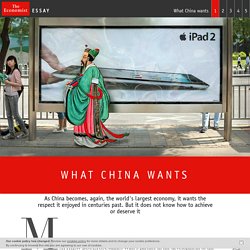
Perhaps most provocative is China’s devotion to the “nine-dash line”, an ill-defined swish of the pen around the South China Sea. Within this perimeter, China claims all the dry land and, it appears, all the water and seabed too; by way of contrast, the rules of the United Nations Convention on the Law of the Sea (UNCLOS) would tend to see quite a lot of those things as subject to claims from other countries.
Speaking in June at the Shangri-La Dialogue, an annual regional-security shindig in Singapore, Wang Guanzhong, a Chinese general, made it clear that although China respected UNCLOS, the convention could not apply retroactively: the nine-dash line was instituted in the 1940s and the islands of the South China Sea have been Chinese for 2,000 years. Others in China have been blunter. Probably not all that much, for now. Ecommerce in China: How the World's Biggest Market Buys Online.
China is poised to become the biggest online marketplace in the world within the next few years, according to multiple estimates.

Online retail generated $121 billion in sales in China last year, up 66% from 2010, according to Barclays Capital. The size of China's ecommerce market is expected to more than triple over the next three years, with sales reaching $420 billion by 2015. That's 20% more than what the U.S.'s ecommerce market is forecast to bring in that year. China has an estimated 193 million online shoppers, more than any other country.
A number of factors are driving the growth. Shipping prices and reliability have also been improved, particularly in urban coastal cities: Shipping costs Chinese corporations about a sixth of what their American counterparts pay, according to BCG. People in China shop online for three main reasons, according to an Acquity Group survey conducted among 1,000 people across roughly 150 cities last year. What's holding them back? Over the past few months, several people have written asking me to offer a short “primer” on China’s upcoming leadership transition, which begins next year.
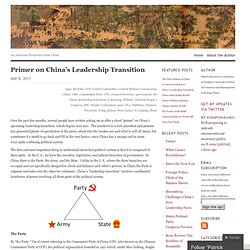
The handover to a new president and premier has generated plenty of speculation in the press, about who the leaders are and what is will all mean, but sometimes it’s useful to go back and fill in the very basics, since China has a unique and in some ways quite confusing political system. The first and most important thing to understand about that political system is that it is composed of three parts. Demography: China’s Achilles heel. Revenge of the Tiger Children - By Wen Liao. View a slide show of China's little emperors.

Caring for the elderly: New homes for the old. All together now EIGHTY-nine-year-old Zheng Jixuan is thrilled with the place where he will live out his dotage: a small but comfy room in the newly built wing of an old-people's home in the city of Hangzhou, 180km (110 miles) south-west of Shanghai.
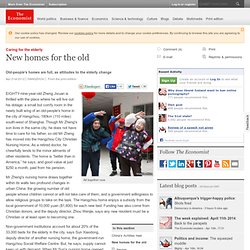
Though Mr Zheng's son lives in the same city, he does not have time to care for his father, so old Mr Zheng has moved into the Hangzhou City Christian Nursing Home. As a retired doctor, he cheerfully tends to the minor ailments of other residents. The home is “better than in America,” he says, and good value at just $250 a month, paid from his pension. Mr Zheng's nursing home draws together within its walls two profound changes in urban China: the growing number of old people whose children cannot or will not take care of them, and a government willingness to allow religious groups to take on the task. Shifting attitudes to the elderly in China's cities have created a huge market opportunity. Swimming Naked in China. With the Chinese government tightening credit, the massive leakage from the formal banking sector into the ‘shadow system’ ultimately risks sinking the country’s financial system.
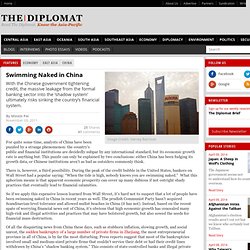
For quite some time, analysts of China have been puzzled by a strange phenomenon: the country’s public and financial institutions are decidedly subpar by any international standard, but its economic growth rate is anything but. This puzzle can only be explained by two conclusions: either China has been fudging its growth data, or Chinese institutions aren’t as bad as outsiders commonly think. There is, however, a third possibility. During the peak of the credit bubble in the United States, bankers on Wall Street had a popular saying: “When the tide is high, nobody knows you are swimming naked.”
What this aphorism means is that apparent economic prosperity can cover up many dubious if not outright shady practices that eventually lead to financial calamities. China’s Ticking Debt Bomb. China appeared to weather the global economic downturn better than most. But massive local government debt could bring growth to a screeching halt. China’s remarkable economic rebound after the global economic crisis in 2008-2009 has been a source of envy and puzzlement for the rest of the world. Instead of recession, the Chinese economy has recorded double-digit growth, and is actually showing signs of overheating – a sharp contrast with the stagnation in most Western countries.
How did the Chinese do it? Perhaps advocates of ‘Chinese exceptionalism’ are right after all: Beijing has found a secret formula of economic success that has eluded the West. China’s Mega-City Problem. Chengdu is a good example of the problem with China’s mega-cities – a growth for growth’s sake mindset.
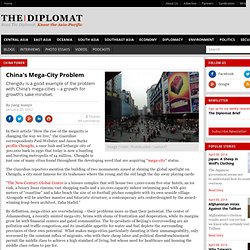
In their article “How the rise of the megacity is changing the way we live,” the Guardian correspondents Paul Webster and Jason Burke profile Chengdu, a once lush and lethargic city of 500,000 back in 1950 that today is now a bustling and bursting metropolis of 14 million. Chengdu is just one of many cities found throughout the developing word that are acquiring “mega-city” status.